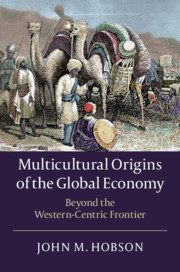Book contents
- Multicultural Origins of the Global Economy
- Multicultural Origins of the Global Economy
- Copyright page
- Dedication
- Contents
- Figures
- Tables
- Acknowledgements
- 1 Mapping a New Global Political Economy
- Part I Multicultural Origins of the First (Historical Capitalist) Global Economy, 1500–1850
- Part II What Was Global about the First Global Economy, 1500–c. 1850?
- Part III Empire and the First Global Economy in the Making of Modern Industrial Capitalism, 1500–1800
- Part IV The Second Great Divergence, 1600–1800: Differing ‘Developmental Architectures’ in Global Contexts
- Part V Rehabilitating and Provincialising Western Imperialism: Afro-Asians inside and outside the Shadow of Empire
- 13 Multicultural Origins of the Second (Modern Capitalist) Global Economy
- 14 Varieties of Global Economy
- Book part
- Bibliography
- Index
13 - Multicultural Origins of the Second (Modern Capitalist) Global Economy
Unveiling the ‘Multicultural Contact Zone’, c. 1850–c. 1940
from Part V - Rehabilitating and Provincialising Western Imperialism: Afro-Asians inside and outside the Shadow of Empire
Published online by Cambridge University Press: 17 December 2020
- Multicultural Origins of the Global Economy
- Multicultural Origins of the Global Economy
- Copyright page
- Dedication
- Contents
- Figures
- Tables
- Acknowledgements
- 1 Mapping a New Global Political Economy
- Part I Multicultural Origins of the First (Historical Capitalist) Global Economy, 1500–1850
- Part II What Was Global about the First Global Economy, 1500–c. 1850?
- Part III Empire and the First Global Economy in the Making of Modern Industrial Capitalism, 1500–1800
- Part IV The Second Great Divergence, 1600–1800: Differing ‘Developmental Architectures’ in Global Contexts
- Part V Rehabilitating and Provincialising Western Imperialism: Afro-Asians inside and outside the Shadow of Empire
- 13 Multicultural Origins of the Second (Modern Capitalist) Global Economy
- 14 Varieties of Global Economy
- Book part
- Bibliography
- Index
Summary
Chapter 13 simultaneously rehabilitates and provincialises British imperialism. Rehabilitating the dark side of empire counters the Eurocentric conception of the ‘benign British civilizing mission’ while provincializing empire counters Eurofetishism's and Indian nationalism’s reification of European hyper-agency and power and their side-lining of Indian and Asian agency. Overall, it focusses on the combination of Western and non-Western agency in the making of the modern capitalist second global economy (SGE). It begins by problematizing the Eurofetishist/Indian nationalist thesis concerning the imperial de-industrialization of India's (as well as China's) cotton industry, arguing that Indian and Chinese peasants retained considerable agency and maintained the handicraft sector throughout the nineteenth- and well into the twentieth-century. The second and third sections highlight the ‘multicultural contact zone’ wherein the entangled agencies of Europeans and Asians converged to produce the SGE after about 1850. I highlight the agential roles of the Parsis, Kachchhis, Gujaratis, Omanis and Chinese and, albeit more briefly, the Nattukottai Chettiars, Sindworkies, Vāniyās, Multānīs and Shīkārpūris, as they interacted either relatively autonomously or with the British. The final section focuses on the symbiotic convergence of the Asian transcontinental bazaar with the European capitalist world-economy in the making of the SGE.
Keywords
- Type
- Chapter
- Information
- Multicultural Origins of the Global EconomyBeyond the Western-Centric Frontier, pp. 395 - 432Publisher: Cambridge University PressPrint publication year: 2020



